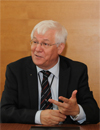 |
||
|
Russian-Designed Reactor at Indian Nuclear Plant Nears Capacity – Source RIA Novosti, PUBLISHED 12.05.2014 Experts working on the construction of India’s Kudankulam nuclear power plant being built with Russian assistance have brought the first reactor unit to 90 percent of its capacity, a source in the industry told RIA Novosti Tuesday. “The first power unit has been brought to 90 percent capacity. It currently generates 900 megawatts for the utility grid of southern India. All systems are working fine,” a source said. The Kudankulam nuclear power plant is being constructed with Russian technical assistance under intergovernmental agreements signed in 1988 and expanded in 1998. The sides are now completing preparations for the second phase of the project. Kudankulam is currently the most up-to-date nuclear plant in the world and the most powerful in India. Other news: Hungary Enacts Law to Expand Nuclear Power With Russian Aid Hungary’s president has signed a bill into law to expand a nuclear power plant in the country with Russian assistance. Hungary Lawmakers OK Russia Nuclear Plant Deal Russia will provide Hungary a loan of up to 10 billion euros ($13.5 billion) - around 80 percent of construction costs. Russia to Lend Hungary $13.7Bln for Nuclear Plant The deal was announced during a state visit to Moscow by Hungarian Prime Minister Viktor Orban and was hailed by Russian President Vladimir Putin. Last news:
|
Hero of the day 
We are currently working with the Nuclear Decommissioning Authority (NDA) on this approach, which was submitted in response to their February 2012 call for alternative proposals. We appreciate that the UK is in the early stages of their policy development activities and are pleased to be involved in such important work. INTERVIEW
Yanko Yanev OPINION
Joint Plan of Action |
Licence Эл №ФС77-30792. ATOMINFO™ trademark.

